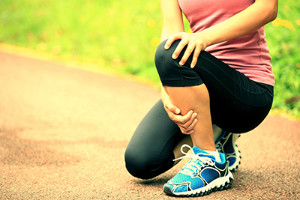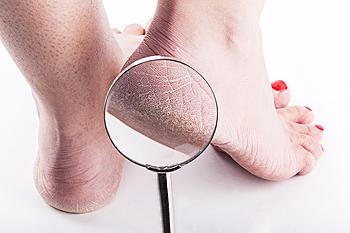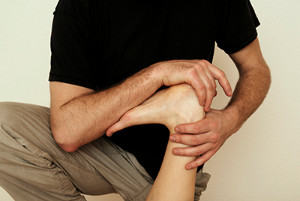
Drexel Hill (484) 521-0233
West Chester (610) 436-5883

Drexel Hill (484) 521-0233
West Chester (610) 436-5883
The plantaris muscle originates above the knee and inserts into the heel joining the Achilles tendon. While the plantaris muscle has no vital function, it is adjacent to the gastrocnemius and soleus muscles which connect with the Achilles tendon for support. If the Achilles tendon begins to tear, this can have serious implications on the leg which will no longer be able to push the foot off the ground. If this injury occurs to you, it is important that you seek help from a podiatrist as soon as possible.
plantaris muscle originates above the knee and inserts into the heel joining the Achilles tendon. While the plantaris muscle has no vital function, it is adjacent to the gastrocnemius and soleus muscles which connect with the Achilles tendon for support. If the Achilles tendon begins to tear, this can have serious implications on the leg which will no longer be able to push the foot off the ground. If this injury occurs to you, it is important that you seek help from a podiatrist as soon as possible.
Achilles tendon injuries need immediate attention to avoid future complications. If you have any concerns, contact the podiatrists of Dr. Siegerman & Associates. Our doctors can provide the care you need to keep you pain-free and on your feet.
What Is the Achilles Tendon?
The Achilles tendon is a tendon that connects the lower leg muscles and calf to the heel of the foot. It is the strongest tendon in the human body and is essential for making movement possible. Because this tendon is such an integral part of the body, any injuries to it can create immense difficulties and should immediately be presented to a doctor.
What Are the Symptoms of an Achilles Tendon Injury?
There are various types of injuries that can affect the Achilles tendon. The two most common injuries are Achilles tendinitis and ruptures of the tendon.
Achilles Tendinitis Symptoms
Rupture Symptoms
Treatment and Prevention
Achilles tendon injuries are diagnosed by a thorough physical evaluation, which can include an MRI. Treatment involves rest, physical therapy, and in some cases, surgery. However, various preventative measures can be taken to avoid these injuries, such as:
If you have any questions please feel free to contact one of our offices located in Drexel Hill and West Chester, PA . We offer the newest diagnostic tools and technology to treat your foot and ankle needs.
 With warmer weather in our midst, many may be thinking about summer sandals and in turn, exposing their feet. Some people, however, may be wary of revealing their bare feet due to concerns about cracked heels and dry skin. If you are one of these people, consider the following tip to have your feet sandal-ready. Slather petroleum jelly onto the feet before bedtime and then put on a pair of socks. This will ensure that the jelly is fully absorbed and kept against the skin, helping to draw water to the surface and make for smooth feet in the morning. Excess petroleum jelly can be rinsed off with warm soap and water.
With warmer weather in our midst, many may be thinking about summer sandals and in turn, exposing their feet. Some people, however, may be wary of revealing their bare feet due to concerns about cracked heels and dry skin. If you are one of these people, consider the following tip to have your feet sandal-ready. Slather petroleum jelly onto the feet before bedtime and then put on a pair of socks. This will ensure that the jelly is fully absorbed and kept against the skin, helping to draw water to the surface and make for smooth feet in the morning. Excess petroleum jelly can be rinsed off with warm soap and water.
Cracked heels are unsightly and can cause further damage to your shoes and feet. If you have any concerns, contact the podiatrists from Dr. Siegerman & Associates. Our doctors can provide the care you need to keep you pain-free and on your feet.
Cracked Heels
Cracked heels appear unappealing and can make it harder for you walk around in sandals. Aside from looking unpleasant, cracked heels can also tear stockings, socks, and wear out your shoes. There are several methods to help restore a cracked heel and prevent further damage.
How Do You Get Them?
Dry skin is the number one culprit in creating cracked heels. Many athletes, walkers, joggers, and even swimmers suffer from cracked heels. Age and skin oil production play a role to getting cracked heels as well.
Promote Healing
Over the counter medicines can help, especially for those that need instant relief or who suffer from chronic dry feet.
Wear Socks – Wearing socks with medicated creams helps lock in moisture.
Moisturizers – Applying both day and night will help alleviate dryness which causes cracking.
Pumice Stones – These exfoliate and remove dead skin, which allows for smoother moisturizer application and better absorption into the skin.
Change in Diet
Eating healthy with a well-balanced diet will give the skin a fresh and radiant look. Your body responds to the kinds of food you ingest. Omega-3 fatty acids and zinc supplements can also revitalize skin tissue.
Most importantly, seek professional help if unsure how to proceed in treating cracked heels. A podiatrist will help you with any questions or information needed.
If you have any questions, please feel free to contact one of our offices located in Drexel Hill and West Chester, PA . We offer the newest diagnostic and treatment technologies for all your foot care needs.
 During the winter season at the beginning of the year, many people strive to get into shape for the upcoming summer season. Before jumping straight into working out however, many podiatrists agree that it is important to warm up and stretch properly. Injuries such as stress fractures, tendonitis, and plantar fasciitis are all more likely to occur if the feet are not stretched properly. In addition to stretching and warming up, wearing supportive sneakers and slowly increasing high impact activities can also minimize your risk of suffering these injuries.
During the winter season at the beginning of the year, many people strive to get into shape for the upcoming summer season. Before jumping straight into working out however, many podiatrists agree that it is important to warm up and stretch properly. Injuries such as stress fractures, tendonitis, and plantar fasciitis are all more likely to occur if the feet are not stretched properly. In addition to stretching and warming up, wearing supportive sneakers and slowly increasing high impact activities can also minimize your risk of suffering these injuries.
Stretching the feet is a great way to prevent injuries. If you have any concerns with your feet consult with the podiatrists from Dr. Siegerman & Associates. Our doctors will assess your condition and provide you with quality foot and ankle treatment.
Stretching the Feet
Being the backbone of the body, the feet carry your entire weight and can easily become overexerted, causing cramps and pain. As with any body part, stretching your feet can serve many benefits. From increasing flexibility to even providing some pain relief, be sure to give your feet a stretch from time to time. This is especially important for athletes or anyone performing aerobic exercises, but anyone experiencing foot pain or is on their feet constantly should also engage in this practice.
Great ways to stretch your feet:
Individuals who tend to their feet by regular stretching every day should be able to minimize foot pain and prevent new problems from arising.
If you have any questions, please feel free to contact one of our offices located in Drexel Hill and West Chester, PA . We offer the newest diagnostic and treatment technologies for all your foot care needs.
 Pregnancy can create additional pressure on the feet, making certain everyday activities and responsibilities difficult for women. Women who work desk jobs should ensure that they’re sitting in chairs that offer optimal support, while women who spend a majority of their time standing should occasionally elevate their feet using a foot rest. Wearing comfortable shoes is also a must and should never be overlooked. Elevating the feet can also help pregnant women in managing edema, as the feet often swell during pregnancy.
Pregnancy can create additional pressure on the feet, making certain everyday activities and responsibilities difficult for women. Women who work desk jobs should ensure that they’re sitting in chairs that offer optimal support, while women who spend a majority of their time standing should occasionally elevate their feet using a foot rest. Wearing comfortable shoes is also a must and should never be overlooked. Elevating the feet can also help pregnant women in managing edema, as the feet often swell during pregnancy.
Pregnant women with swollen feet can be treated with a variety of different methods that are readily available. For more information about other cures for swollen feet during pregnancy, consult with the podiatrists from Dr. Siegerman & Associates. Our doctors will attend to all of your foot and ankle needs.
What Foot Problems Can Arise During Pregnancy?
One problem that can occur is overpronation, which occurs when the arch of the foot flattens and tends to roll inward. This can cause pain and discomfort in your heels while you’re walking or even just standing up, trying to support your baby.
Another problem is edema, or swelling in the extremities. This often affects the feet during pregnancy but tends to occur in the later stages.
How Can I Keep My Feet Healthy During Pregnancy?
If you have any questions please feel free to contact one of our offices located in Drexel Hill and West Chester, PA . We offer the newest diagnostic and treatment technologies for all your foot and ankle needs.
Request a free copy of
Laser Away Foot Pain!
today.
